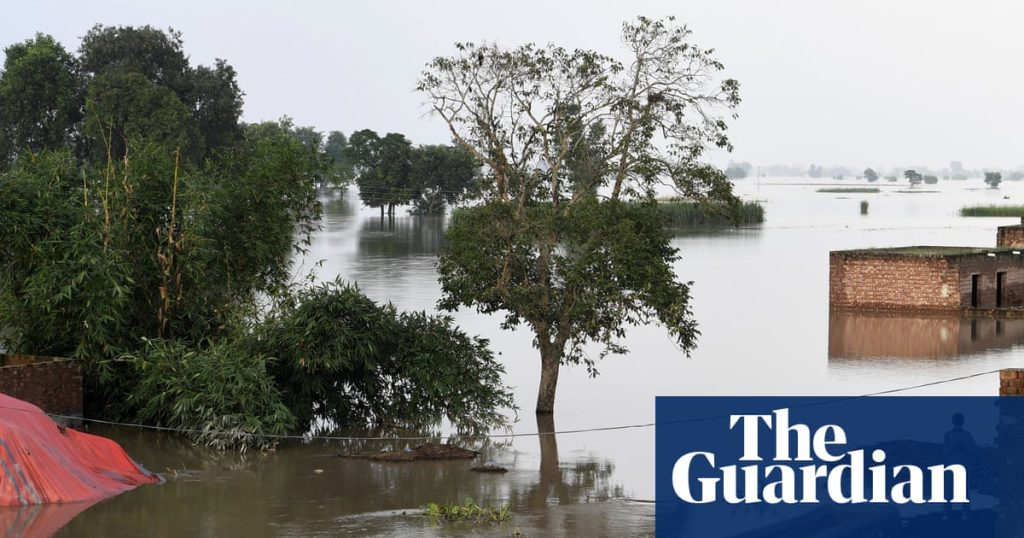A group of Pakistani farmers whose livelihoods were devastated by floods three years ago has fired the starting shot in legal action against two of Germany’s most polluting companies.
Lawyers acting for 43 men and women from the Sindh region sent the energy firm RWE and the cement producer Heidelberg formal letters before action on Tuesday warning of their intention to sue later this year.
Pakistan was the nation most affected by extreme weather events in 2022, according to the global Climate Risk Index. That summer, extreme rains flooded one-third of the country, killing at least 1,700 people, displacing 33 million people, destroying vast tracts of farmland and causing economic losses of up to $30bn.
The Sindh region bore the heaviest toll, with many districts remaining underwater for over a year. During this time the claimants saw their entire land flooded, and lost at least two rice and wheat harvests. They estimate the total damage at €1m, for which they want an acknowledgment of liability and some degree of compensation from the two companies. If they do not get this, they plan to go to court in December.
RWE and Heidelberg Materials are two of Germany’s most polluting companies. RWE is responsible for 0.68% of global industrial greenhouse gas emissions since 1965 through its production of fossil fuels and Heidelberg for at least 0.12% through its cement production, according to new figures from the Climate Accountability Institute, which have not yet been published.
“Those who cause the damage should also pay for it,” said Abdul Hafeez Khoso, a landowner and teacher who lives in the village of Molabuxkhoso in northern Sindh, and is one of the claimants. “We, who have contributed the least to the climate crisis, are losing our homes and livelihoods while corporations in the wealthy north continue to make profits.”
RWE and Heidelberg have been approached for comment.
The planet’s most important stories. Get all the week’s environment news – the good, the bad and the essential
Privacy Notice: Newsletters may contain information about charities, online ads, and content funded by outside parties. If you do not have an account, we will create a guest account for you on theguardian.com to send you this newsletter. You can complete full registration at any time. For more information about how we use your data see our Privacy Policy. We use Google reCaptcha to protect our website and the Google Privacy Policy and Terms of Service apply.
after newsletter promotion
The move is part of a new wave of cross-border climate damages litigation. Last week, a group of typhoon survivors in the Philippines announced they would sue Shell in UK court. And in September, a court in Switzerland held its first hearing on a claim brought against the Swiss cement company Holcim by four inhabitants of the Indonesian island of Pulau Pari.
Over the past few years, European courts have increasingly been open to hearing and deciding claims brought by victims of disasters.
The legal team in the new Pakistan case hopes to build on the ashes of a failed climate lawsuit earlier this year, which also sought damages from RWE. The farmer and mountain guide Saúl Luciano Lliuya could not show that his home was at direct risk of being washed away by a glacial flood but the judge confirmed that companies could theoretically be held liable for climate damages in civil proceedings in German court.
Regarding the Lliuya case, RWE said that it had “always operated its plants in compliance with applicable law … it would be an irreconcilable contradiction if the state permitted CO2 emissions, regulated them in detail and in some instances even required them, but at the same time retroactively imposed civil liability for them.”
By bringing a claim about past, rather than future, harm, the farmers’ legal team hopes to jump over the evidentiary hurdles. It will submit studies showing the impact of anthropogenic climate change on rainfall patterns, including the 2022 Pakistan floods and the Sindh region in particular.
Clara Gonzales, the co-programme director of business and human rights at the European Center for Constitutional and Human Rights, which is also supporting the Holcim case, said they hoped to take case law a step further. She said: “The climate crisis is no longer a theoretical threat; it is a present reality. Diplomacy may have failed affected communities, but the rule of law should be on their side. It is time to draw a clear line: carbon majors should not escape the ‘polluter pays’ principle.”

